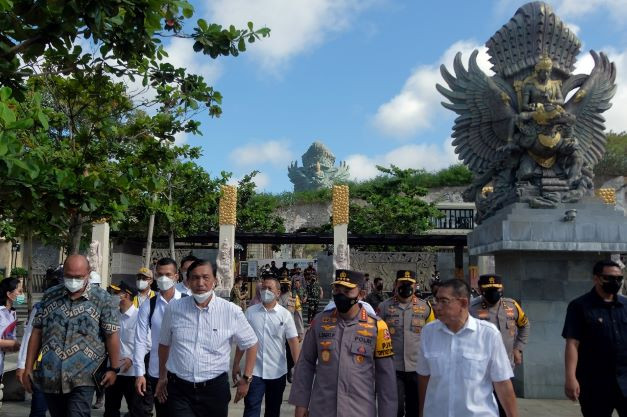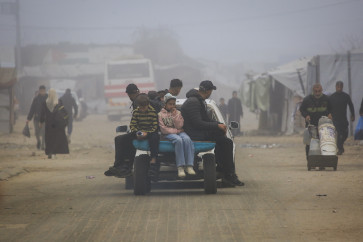Popular Reads
Top Results
Can't find what you're looking for?
View all search resultsPopular Reads
Top Results
Can't find what you're looking for?
View all search resultsIndonesia should give voice to the true concerns of the Global South at the G20
Indonesia must lead the G20 to agree to accelerate the phasing out from coal and fossil fuels, and to ensure there is sufficient financial support to do so.
Change text size
Gift Premium Articles
to Anyone

Indonesia has made a long journey since the fall of president Soeharto in 1998, from military dictatorship to a vibrant democracy in which most of its citizens enjoy greater political freedoms. This accomplishment has been accompanied by an impressive economic growth that has placed the vast archipelago in the Group of 20, where it is the only country representing ASEAN.
By holding the G20 presidency this year, and hosting the group’s summit in November, Indonesia has a unique position to give a voice to the often-sidelined aspirations of the Global South.
The Indonesian government should use that position to promote a form of inclusive collaboration among nations to address challenges that affect humanity as a whole. Among them are the need for stronger and more creative global responses to issues like the devastation caused by armed conflicts such as in Myanmar or Ukraine, the need to increase financial support for a sustainable energy transition, or the impact of the world’s digital transformation on human rights and democracy.
Indonesia has succeeded in sending its military back to the barracks. The country’s recent history of dictatorship, turmoil, and democratization has given it an invaluable wealth of experience that can provide a distinct advantage in its perspective on conflicts and their consequences.
Alongside other countries like Malaysia, Indonesia is already leading efforts within ASEAN to find peaceful solutions to the crisis in Myanmar, acting on the belief that only democracy and stability can foster economic development.
Now Indonesia could use the experience gained by its own history and propose a new working group at the G20 to discuss judicious responses from the largest economies in the world to crises like the one in Myanmar or those plunging countries such as Ukraine, Syria or Yemen into chaos. And, as the third biggest democracy in the world and the country with the largest Muslim population, Indonesia is particularly suited to play a role as peacemaker in the Muslim world.
Wars throughout the world are having devastating consequences that are not confined within national borders: from rising commodity prices, shortages of food and energy supplies, to increases in human trafficking and the production and trade of illicit drugs and weapons. In Myanmar, poverty has skyrocketed to rates not seen in 20 years.
The community of nations is in dire need of alternative platforms to explore new ways to tackle such crises. These platforms would work as complementary channels to global organizations like the United Nations, or regional groups like ASEAN, that have often failed to prevent atrocities, or alleviate the worst consequences of these wars. The G20 could be one of them and Indonesia is uniquely suited to initiate the discussion.
Meanwhile, the need for a sustainable energy transition is already in the G20 agenda, and Indonesia should be commended for acknowledging the importance of taking collective action to phase out fossil fuels and adopt renewable sources of energy.
The stakes have never been higher. The latest study from the UN’s Intergovernmental Panel on Climate Change (IPCC) has confirmed that current pledges to reduce carbon emissions will not be sufficient to slow global warming.
All countries must cut global emissions by 43 percent and reach net-zero carbon emissions by the early 2050s to avoid a climate catastrophe. Implementing a sustainable energy transition that takes into account the needs and perspectives of all the people involved is both the most efficient and cost-effective way to do so.
As a vital step, Indonesia must lead the G20 to agree to accelerate the phasing out from coal and fossil fuels, and to ensure there is sufficient financial support to do so. With its presidency, the country finds itself in the position to push for G20 countries to increase their financial commitments and assistance to those facing major barriers in their energy transition.
Last, but by no means least, as economies and societies at large increasingly move toward digitalization, it is no longer possible to ignore the powerful role played by “tech giants”, or big technological companies, in particular Google, Amazon, Meta, and Apple, in shaping not only the world economy, but the state of democracy and human rights globally.
The services these tech giants offer come at a huge cost. By harvesting and selling our personal data in order to predict and shape consumers’ behavior, they track our online behavior in every view, click, purchase, and interaction, in order to analyze and monetize it. The profits obtained by these enormous companies on the back of people’s personal data are bigger than some rich countries’ gross domestic product.
Their unregulated money-making model is also allowing them to profit from the spread of disinformation, divisiveness, and hate. And these phenomena are undermining democracy, stability, and social cohesion in many countries, from the United States, where conspiracy theories like Qanon are spreading like fire, to the Philippines, where online disinformation is rampant.
Indonesia leads the streamlining of digital issues in the various working groups of the G20, and rallies for an inclusive, empowering and sustainable digital transformation aimed at a resilient recovery from the pandemic. But it must also ensure that these discussions do not take place without addressing the damage that the Big Tech’s business models are having on people’s individual rights and democracy worldwide.
Indonesia is not new to playing a central role in world affairs. In 1955, it organized the Bandung Conference, a watershed moment that led to the creation of the Non-Aligned Movement. The world has changed enormously since then, but Indonesia finds itself now in a position where it can once again represent the interests and aspirations of the Global South and help to find solutions to problems that deeply affect all the inhabitants of this planet.
***
The writer is a board member of ASEAN Parliamentarians for Human Rights (APHR), and a former member of Indonesian House of Representatives.










